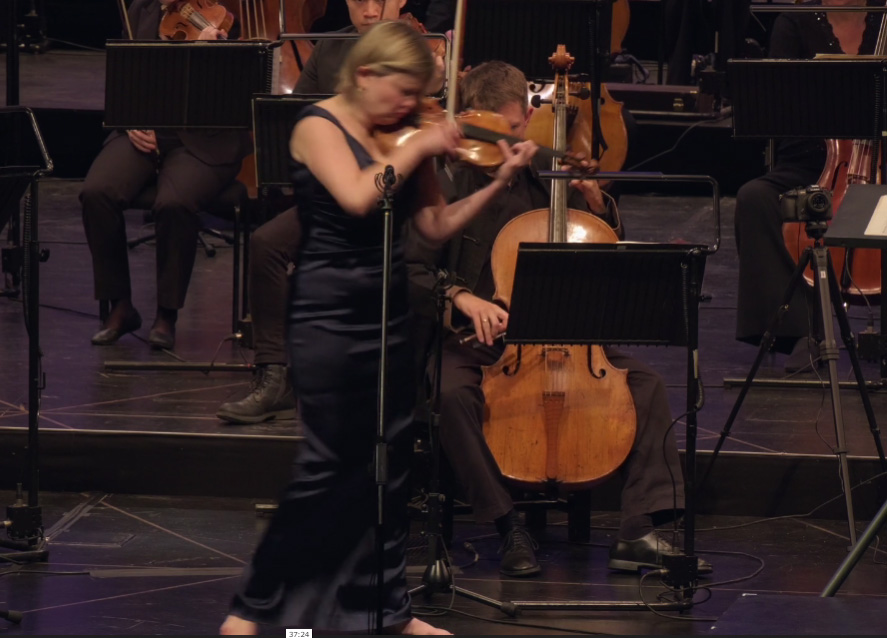Perhaps a new career beckons …
A bit of context.
I am a big fan of an orchestra called the Orchestra of the Age of Enlightenment. I’m a ‘friend’ for priority booking and occasional special treats one of which is monthly sessions in pubs (Zoom for the last year) to meet the members of the band so you get to know them a bit and makes the concerts more interesting. Just recently they offered friends a three session course on writing music criticism. I haven’t written a critical essay since A levels so I thought it would stretch me a bit. The tutor was Andrew Mellor who writes music reviews for the Financial Times and Gramophone Magazine and is well regarded. He set us a task to write a review of a concert which is streamed on the OAE’s platform – Brahms Violin Concerto played by a young Russian violinist Alina Ibragimova. It was an odd event in that the orchestra was on the stage at Glyndebourne Opera House and it was in a lockdown gap so there was an audience. Here’s what I wrote for my homework:

Glyndebourne in January?
Don’t get too excited – it was a virtual trip courtesy of the Orchestra of the Age of Enlightenment’s OAE Player digital concert platform. The Fidelio overture and selected arias opened the programme before the main vent – Alina Ibragimova playing Brahms’ violin concerto.
Premiered on 8 January the concert was a real delight on several counts. There was an audience of real people, there was a substantial orchestra with many familiar faces from the OAE’s excellent lockdown Zoom ‘Meet the Band’ sessions and they were on the stage of the opera house not in the pit. So visually it was already a bit different before I get to the music.
Mark Elder was at the helm of the orchestra and seemed to be having a good time throughout. I think he was a startled as many when Ibragimova entered stage right sleek in shiny black frock and pranced bare feet extended to her position on the conductor’s left. Her first musical entry after prowling around during the introduction was little short of brutal. She attacked the strings with great force but counterbalanced it with a sensitivity that showed her range and a complete understanding of the complexity of the score. It was a highly affecting performance with pointed dialogues with the flute, sweeping serenades with the strings and a first movement cadenza that sounded entirely as if she was making it up on the spot. It might have been originally written for Joachim but there was no doubt that this was an outpouring from Alina’s very soul. The movement so moved the audience that there was spontaneous applause, something the OAE has welcomed in the past and which former alumna Chi Chi Nwanoku’s Chineke! Orchestra positively encourages.

The exhausted strings needed a lengthy retune after such an energetic first movement which positively galloped by like a circuit of the Grand National – fortunately with no fallers – close up shots of band members showed both fierce concentration and shared elation. Digital relays can often be disappointing but the variety of camera angles, shot selection and an excellent sound balance made this a truly immersive experience especially as I had my laptop casting to a big TV with a decent sound system.
The vodka shots that had pinged from Ibragimova’s instrument in the first part were now replaced with something akin to a black velvet. The depth and smoothness of the Guinness leavened by champagne sparkles as the soloist traded phrases with the oboe and teased almost ecstatic beauty from Brahms’ lyrical passages where to keep up the foodie references, her violin took on a honeyed tone. But if the second movement was relatively short and sweet the final act of this dramatic performance once again reverted to Brahms in full Sturm und Drang mode. But Elder, Ibragimova and the orchestra showed us the inherent classical elements of Brahms’ writing alongside the more overtly romantic. Intricate passages were presented clearly and the interplay with the elements of the orchestra showed an intimacy and rapport that was both moving and enlightening.
Compared with other recordings I’ve heard this was fast but there was an attention to detail and a clarity from the baroque instruments that gave me new insights into the piece. It was a prime example of the OAE’s commitment to exploring new repertoire for them and new ways of presenting it. Given the deprivations of successive lockdowns, this was a concert to relish and revisit. But fortunately you don’t have to take my word for it – anybody can rent it from OAE Player for just £7. But to enjoy all the great material they have available an annual pass at £99 is well worthwhile.
Andrew Mellor’s appraisal
Frankly, it is hard to find fault with your review. It has extreme clarity, excellent musical analysis and deals with everything that needs to be dealt with in an easy tone but one that contains great depth of thought. I like the way you open with a joke which plays straight off the headline. Sadly in real-life the subeditors always tend to change our headlines…
You write with style and extreme fluency, but I suspect that is the result of hard work and engineering your text. I do appreciate the feeling of being talked to rather than ‘written to’ here, and the reader will to.
None of that would count for much without your ears. Your analysis of the performance is very astute – you deal with the macro and micro elements of the performance and I particularly appreciate your dealing with the aesthetic question…but wearing this sophisticated analysis lightly. Likewise, your alcohol metaphor goes down very well indeed.
Excellent final summary too – leaving us in no doubt as to your evaluation of the experience.
